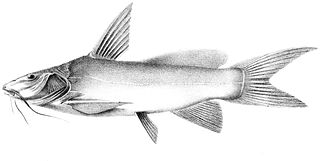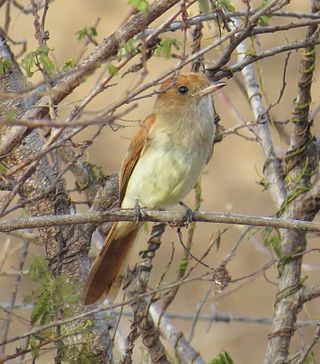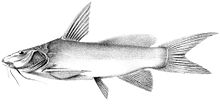
The Chao Phraya River is the major river in Thailand, with its low alluvial plain forming the centre of the country. It flows through Bangkok and then into the Gulf of Thailand.

Pseudobalistes fuscus is a fish belonging to the family Balistidae.

Pelobates fuscus is a species of toad in the family Pelobatidae, native to an area extending from Central Europe to Western Asia. It is commonly known as the common spadefoot, garlic toad, the common spadefoot toad and the European common spadefoot.
Galaxias fuscus, the barred galaxias, is a galaxiid of the genus Galaxias, a member of the Mountain Galaxias species complex group of freshwater fish, found in Australia.

The brown shyshark or plain happy is a species of shark belonging to the family Pentanchidae, the deepwater catsharks. It is endemic to the shallow, coastal waters of South Africa from west of Cape Agulhas to KwaZulu-Natal. This benthic species is usually found over sandy or rocky bottoms. Measuring up to 73 cm (29 in) long, the brown shyshark is stoutly built, with a broad, flattened head and rounded snout. Unlike other shysharks, the brown shyshark has a plain brown color, though some individuals have faint "saddle" markings or light or dark spots. When threatened, this shark curls into a circle with its tail over its eyes, which is the origin of the name "shyshark". It feeds on bony fishes and lobsters, and is oviparous with females laying pairs of egg capsules. The International Union for Conservation of Nature (IUCN) has assessed this harmless species as Vulnerable. It is of no commercial or recreational interest, but its limited distribution makes its entire population vulnerable to increases in fishing pressure or habitat degradation.

The Alabama waterdog is a medium-sized perennibranch salamander inhabiting rivers and streams of Alabama. It is listed as endangered by the IUCN and the United States Fish and Wildlife Service.
The Guadeloupe big brown bat is a species of vesper bat. It is found only on the island of Guadeloupe. It is one of the eleven species of bat found on Guadeloupe, and one of three that are endemic.

The plateau vole is a species of rodent in the family Cricetidae. It was originally listed as Lasiopodomys, but was moved to Neodon in 2012. It is found only in China. Its natural habitat is temperate grassland.

The broad-toothed mouse or broad-toothed rat is a species of rodent in the family Muridae.

Ancharius, the Vaonas, is a small genus of catfishes of the family Anchariidae.
Eleutherodactylus fuscus is a species of frog in the family Eleutherodactylidae endemic to Jamaica. Its natural habitats are subtropical or tropical moist lowland forest and rocky areas. It is threatened by habitat loss.

Desmognathus fuscus is a species of amphibian in the family Plethodontidae. The species is commonly called the dusky salamander or northern dusky salamander to distinguish it from populations in the southern United States which form several distinct species, the southern dusky salamanders. The northern dusky salamander is the most widespread representative of its genus in Canada. It can be found in eastern North America from extreme eastern Canada in New Brunswick south to South Carolina. The size of the species' total population is unknown, but is assumed to easily exceed 100,000. The species' habitat differs somewhat geographically; dusky salamanders in the northern part of the range prefer rocky woodland streams, seepages, and springs, while those in the south favor floodplains, sloughs, and muddy places along upland streams. They are most common where water is running or trickling. They hide under various objects, such as leaves or rocks, either in or near water. Alternatively, they may enter burrows for protection. The dusky salamander lays its eggs close to water under moss or rocks, in logs, or in stream-bank cavities. The larval stage which follows is normally aquatic.

The ash-throated casiornis is a species of bird in the family Tyrannidae. It is endemic to northeastern Brazil.

The dusky elephant shrew or dusky sengi is a species of elephant shrew in the family Macroscelididae. It is found in Malawi, Mozambique, and Zambia. Its natural habitat is dry savanna.
Pseudotropheus fuscus is a species of cichlid endemic to Lake Malawi where it is known from Nkhata Bay and Lion's Cove. It prefers areas with rocky substrates, usually at depths of 5 metres (16 ft) or less. It feeds on algae. This species can reach a length of 11 centimetres (4.3 in) TL. It can also be found in the aquarium trade.
Ancharius griseus is a species of catfish of family Anchariidae. It inhabits the Onilahy River basin of western Madagascar. A. griseus reaches about 24.4 cm (9.6 in) SL.
Gogo brevibarbis is a species of catfish in the family Anchariidae. It is commonly referred to as the vaona though this name also refers to Ancharius fuscus. It is endemic to Madagascar where it is only known from the holotype, which is apparently from the Mananjary River basin. Its natural habitat is rivers. It is threatened by habitat loss. It grows to a length of 25 cm.
Ancharius is the nomen of the Roman gens Ancharia. It may refer to various members of that family.

The northern pipefish is a northwest Atlantic species of fish belonging to the family Syngnathidae.
Aipysurus fuscus, commonly known as the dusky sea snake or Timor Reef snake, is a species of sea snake in the family Elapidae. It is found in the Timor Sea between Australia, Indonesia and East Timor and has been classified as endangered.













